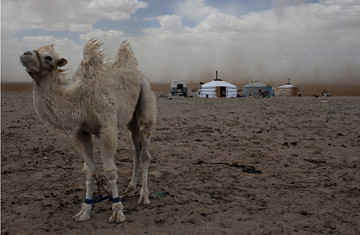
Nomads still live in traditional gers around Mongolia's biggest economic undertaking: the Oyu Tolgoi mine.
(4 of 6)
Worries about being overwhelmed by foreign powers are natural for any frontier economy. But geography is a particularly hard mistress for Mongolia. Every ounce of coal, gold, copper or uranium will have to exit the country through one of its two neighbors, Russia and China. Every mining deal it signs with one country runs the risk of irking the other.
Eager to secure natural resources just north of its border, China has pushed hard into Mongolia. But its little neighbor has at times shoved right back. In April, a Mongolian outcry scuttled the chances of the Aluminum Corp. of China taking over a coal venture in South Gobi province. (The Chinese company is now trying again.) Chinese workers who have poured into Mongolia to build badly needed infrastructure have been attacked by ultra-nationalists. Surveys by Sant Maral, an Ulan Bator--based polling firm, show that 95% of Mongolians distrust the Chinese, even though 90% of the country's exports head to China. The antipathy extends beyond the economy. The Dalai Lama, the Tibetan spiritual leader who is considered a "wolf in monk's clothing" by Beijing, is revered by Mongolian Buddhists and has visited eight times. Each time he does, the Chinese government releases petulant statements; on occasion, China has even severed rail links between the two countries as punishment. Mongolia's response? Extending a firm welcome back to the Dalai Lama.
Into this breach has stepped the U.S., the country Mongolians like to call their "third neighbor." More Mongolian expatriates live in the U.S. than in China or Russia. George W. Bush visited Mongolia in 2005, and Barack Obama hosted Elbegdorj at the Oval Office last year. In return for all that American love, Mongolia has embraced its role as a U.S. ally. Mongolian soldiers have served in peacekeeping missions in Iraq and Afghanistan. When Secretary of State Hillary Clinton visited in July, she heaped praise on her hosts. "Mongolia is an inspiration and a model," she said. "Against long odds, surrounded by powerful neighbors who had their own ideas about Mongolia's future, the Mongolian people came together with great courage to transform a one-party communist dictatorship into a pluralistic, democratic political system."
Americans aren't interested only in lofty ideals. Mongolia makes a useful hedge against Russia and China in the game of geopolitics. Currently, much of the U.S. money funneled to Mongolia is foreign aid destined for what reformers call "democracy building." (Chinese aid to Mongolia, however, dwarfs American assistance.) But of what practical benefit is democratic solidarity if there is no economic payoff? Mongolia is booming, yet the biggest U.S. investor in the country for now is Caterpillar, the heavy-machinery maker. Indeed, Americans don't have a big piece of any major resource deal. "The Americans dropped the ball in Mongolia," says Edward Rochette, the American former senior vice president of Ivanhoe, who lives in Ulan Bator. "We came in naive, pontificating about democracy, anticorruption stuff. Meanwhile, the Chinese and Russians slipped in, and we were left in the dust."
